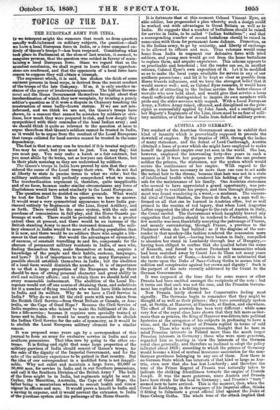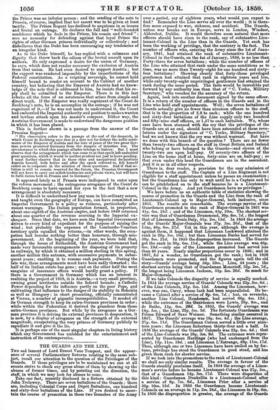AUSTRIA AND GERMANY.
'Dile conduct of the Austrian Government -seems to exhibit that kind of insanity which is proverbially supposed to precede the downfall of empires. By the treaties of 181-3, through the laches of many statesmen, and the defeat of Lord Castlereagh, Austria obtained a lease of power which she might have employed to make herself the grandest empire ever yet seen in the world. She has, however, employed the intervening forty-five years in such a manner as if it were her purpose to prove that she can produce neither the princes, -the statesmen, nor the system which would secure the continuance of her empire. With regard to the princes it has been necessary in more than one case to set aside the actual heir to the throne, because that heir was not in a state of intellectual health which rendered his holding of the sceptre safe for the maintenance of his family. One Austrian statesman who seemed to have appreciated a grand opportunity, was per- mitted only to ventilate his project, and then through disappoint- meat was found wandering in a wood,—a madman. The success- ful rival of Count Stadion, the Baron de Bach, is a man well in- formed on all that an be learned in Austrian office but so well primed in the routine of red tapery, that when Lord Augustus Loftus suggested the idea of danger to the rule of Austria in Italy, the Count smiled. The Government which haughtily braved any suggestion that justice should be rendered to Piedmont, within a few months was seen thankfully accepting the patronage of France, and meanly surrendering, through France, a province to the Piedmont whom she had bullied ; as if the disguise of the our. render in that-monkey-like fashion rendered the concession more dignified! And at last,—having been beaten in Italy, compelled to abandon her stand in Lombardy through fear of Hungary,— having been obliged to confess that she quailed before the name of Kossuth, and forced to restore Protestant immunities which had been snatched away by Count Leo de Than not many years back at the dictate of Rome,—Austria is still so infatuated that she turns upon the Duke of Saxe-Coburg Gotha to accuse him of sedition and conspiracies against her crown and dignity? Such is the purport of the note recently addressed by the Count to the German Governments.
It was supposed at the time that for some reason or other Prussia had been omitted amongst the recipients of the note ; but it turns out that such was not the case, and the Prussian Govern- ment has replied in a befitting tone.
Now Prussia lately showed her Conservative feeling most signally. The Germans begin to remember that they might be thought of as well as their princes ; they have accordingly spoken out, at Stettin, at Hanover, at Eisenach, at Emden, and elsewhere. The effect of these avowals has been very different ; while some very few of the royal class have shown that they felt more as Ger- mans than as princes, the King of Hanover was driven into political hysterics at the arrogance of 'his subjects in professing to have a von*, and the Prince Regent of Prussia replied in terms of cold reserve. Those who were ungenerous, thought that he bore in mind Prussian interests in Poland more than the much larger Prussian interests in Germany ; those who were more generous, regarded him as bearing in view the interests of the German royal class generally, and therefore as inclined to adopt the policy initiated about 1818; according to which the princes of Germany would become a kind of mutual insurance association for the non- German provinces belonging to any one of them. Now there is no German State which has interests of that kind so large as Aus- tria, even now that she has lost Lombardy ; and therefore the tone of the Prince Regent of Prussia was naturally taken to indicate the striking friendliness towards the empire of Francis Joseph. It was the more generous, since Austria and Prussia have been rivals for the lead in Germany ; and Prussia's "turn" seemed now to have arrived. This is the moment, then, when the Count de Rechberg, in the arrogance of his Imperial office, thinks; it fitting to fulminate a great official libel against the Duke of Saxe-Coburg Gotha. The whole tone of the attack implied that
the Prince was an inferior person ; and the sending of the note to Prussia, of course, implied that her assent was to be given at least tacitly. The Prince Regent has declined to acquiesce in so insane and brutal an outrage. He declares the full and "well-founded confidence which he feels in the Prince, his cousin and friend" ; sees no necessity for defending against that loyal Prince the rights of other German princes individually or collectively ; and disbelieves that the Duke has been encouraging any tendencies of an irregular kind. As to the Duke himself, he has replied with a calmness and dignity that throw back the odium of the brutal assault upon its authors. He only expressed a desire for the union of Germany, he says which does not render necessary the exclusion of Austria from that union. He had even desired to support Austria ; but the support was rendered impossible by the imperfections of the Federal constitution. As a reigning sovereign, he cannot hold himself bound to render an account to the Cabinet of another country, but believing that the Emperor of Austria had no know- ledge of the note that is addressed to him, he insists that his re- ply shall be submitted to the Emperor. There is in this last rebuke all the force of an astuteness that arises from simple and direct truth. If the Emperor was really cognizant of the Count de Rechberg's note, he is an accomplice in the outrage ; if he was not cognizant of it,-if he was not made to understand it, the Count had embezzled the Imperial authority and position to make a wanton and lawless attack upon his master's compeer. Either way, the Austrian Government is made to understand the dangerous position in which it has been placed. This is further shown in a passage from the answer of the Prussian Regent-
" His observation refers to the passage at the end of the despatch, in which Count de Hochberg says that at a date not far distant the noble senti- ments of the Emperor of Austria and the love of peace of the two great Ger- man powers preserved Germany from the dangers of intestine war. The circumstance to which this passage alludes belongs to history. But I must observe that the arrangement which was come to at that epoch left undecided great questions, which it would be neither prudent nor just to leave pending. I must further observe that in these clear and unequivocal declarations Austria herself, both before and after the epoch referred to, felt herself called on to cooperate in the solution of those questions. And if that so- lution is still to remain reserved for the future, the Prussian Government will not have to cam- out selfish tendencies and private views, but will have to fulfil duties both to Prussia and to Germany. '
It appeared lately as if Prussia were indisposed to enter upon the reform movement ; the outrageous arrogance of the Count de Rechberg seems to have opened her eyes to the fact that a new arrangement is absolutely necessary.
It is difficult to understand how any man in his ordinary senses, and taught even the geography of Europe, can have committed an Imperial Government to a policy so ruinous, particularly after recent warnings. The Italian population formed, in proportion, about one-eighth of the Austrian empire, and before 1848 returned about one quarter of the revenue accruing to the Imperial ex- chequer. Since that date, we have seen the Imperial Government driven to every kind of expedient for the purpose of raising the wind ; but probably the expenses of the Lombardo-Venetian territory quite equalled the returns,-in other words, the occu- pation had, become nothing better than honorary, through mis- government. At the beginning of the year, we were told that, through the house of Rothschild, the Austrian Government had made very favourable arrangements for disposing of its property in railways by which it obtained a million sterling in this spring, another million this autumn, with successive payments in subse- quent years ; enabling it to resume cash payments. During the late war, these arrangements must have been sadly thwarted ; the half of its Italian estate has gone ; and on the other half the most sanguine of insurance offices would hardly grant a policy. If there is a Government in Germany which has an interest in realizing the project of 1818, it is Austria,-a very small province, owning great territories outside the federal bounds ; a Catholic Power depending for its influence partly on the poor Pope, and cultivating that influence to the danger of its stability in Bohemia as well as Hungary ; in short presenting, officially concentrated at Vienna, a number of gigantic incompatibilities. It needed all its German strength to keep its extra-German provinces in order ; while within the Federation it derived its grandeur from those extra-German provinces. But while by its arrogance as a Ger- man province it is driving its external provinces to desperation, it is now, by a display of arrogance on the strength of its external magnitude, exasperating the very princes of Germany publicly to repudiate it and give it the lie. It is perhaps one of the most singular chapters in living history which any Government has unfolded for the entertainment and instruction of its contemporaries.



























 Previous page
Previous page